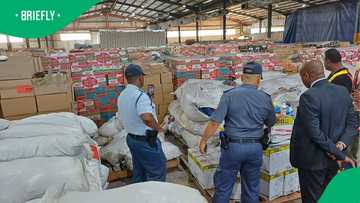President Cyril Ramaphosa Addresses Child Food Poisoning Deaths Amid Crackdown on Spaza Shops
- President Cyril Ramaphosa addressed the nation on the spate of food poisoning deaths sweeping across the country
- In his address on Friday, 15 November 2024, Ramaphosa outlined several immediate measures to deal with the crisis
- The president noted there was no evidence suggesting deliberate actions to poison children by foreign-owned spaza shops

Source: Twitter
TSHWANE — As the nation watched, President Cyril Ramaphosa finally delivered his highly anticipated response to the food poisoning crisis that has been battering SA since the beginning of the year on Friday, 15 November 2024.
Thousands of cases, mainly affecting primary and high school pupils, have been reported across the country, with numerous deaths.
Ramaphosa responds to spaza shop deaths
During his address, Ramaphosa said the government had recorded 890 reported incidents nationally between September and November.
PAY ATTENTION: stay informed and follow us on Google News!
Gauteng — with over 300 incidents and two dozen deaths since February — and KwaZulu-Natal recorded the most cases, followed by Mpumalanga, Limpopo and the Free State accounting for 22 children deaths in that time.

Read also
KZN police raid Durban warehouses stocking expired baby foods, spices and alcohol sold at spazas
However, he cautioned against misinformation, emphasising that investigations had not pointed to any deliberate action taken to cause the poisonings.
"There is no suggestion of any deliberate campaign or evidence the problem is confined to spaza shops owned by foreign nationals only," said Ramaphosa.
He noted the Naledi incident in Soweto in which six children, aged between seven and nine, died after reportedly consuming tainted snacks from a local spaza shop in early October.
Later the same month, the government declared the ongoing crisis a national security threat, and the African Transformation Movement (ATM) heightened calls for intervention, beckoning the Public Protector's attention in its letter to the Chapter 9 institution dated 22 October.
The National Joint Operational and Intelligence Structure (NatJOINTS), comprising the South African Police Service (SAPS), the Department of Agriculture, and the National Consumer Commission, among others, determined that the spate of cases stemmed from a chemical agent.
Scientific tests conducted by the National Institute for Communicable Diseases (NICD) showed that from samples taken from 84 spaza shops in the Naledi area, a highly hazardous organophosphate chemical used as a pesticide, Terbufos, was found in three and was attributed to the six Soweto children's deaths.

Read also
Gauteng Department of Education says schools must obtain certificate of acceptability to sell food
Ramaphosa said these products were as likely to be sold in shops owned by locals as with foreign-owned businesses.
"We all have a duty — as the government, society, and families and parents – to protect children."
Ramaphosa declared numerous measures to deal with the scourge, among which immediate actions included:
- Closing down spaza shops implicated in the deaths of children;
- Registering spaza shops and other food handling facilities within 21 days;
- Law enforcement investigations, arresting and prosecuting offenders;
- Compliance inspections of food handling facilities, manufacturers, distributors, wholesalers, retailers, spaza shops, and general dealers;
- Shutting down non-compliant businesses and shops linked to poisoning incidents or found to stock hazardous chemicals unlawfully;
- Door-to-door inspection of spazas, tuckshops and other informal traders;
- Inspection of registered Terbufos manufacturers to ensure products are not diverted into the non-agricultural market; and
- Strengthening regulations and protocols on pesticide, insecticide and foodstuff sales, traceability, repackaging, and destruction.
Ramaphosa said another chemical, Aldicarb, and an organophosphate, Galephirimi, were sold by street vendors and hawkers to control rat infestations, mainly in many townships, informal settlements, and hostel communities.
In 2016, South Africa banned the use of Aldicarb. Despite this, six children in Ekurhuleni and Soweto died after exposure to it in 2023.
"The cheapest remedies to deal with rat infestation resulting, among others, from poor waste management in poor communities, are often highly hazardous substances like Terbufos and Aldicarb.
"The local government is responsible for ensuring [satisfactory] environmental health [standards]. However, most municipalities don't have the capacity or resources to conduct inspections and enforce regulations.
"Therefore, we must address all the factors contributing to the problem in our response," added Ramaphosa.
Presidency responds to deaths of 5 children
In related news, Briefly News reported that the deaths of the then-five children in Naledi sparked outrage from the community in the days after.
The incident sparked angry scenes of looting and the shutting down of foreign-owned tuck shops as tensions swept across the township. Later, the Minister in the Presidency, Khumbudzo Ntshavheni, expressed the government's stance.
PAY ATTENTION: Follow Briefly News on Twitter and never miss the hottest topics! Find us at @brieflyza!
Source: Briefly News


